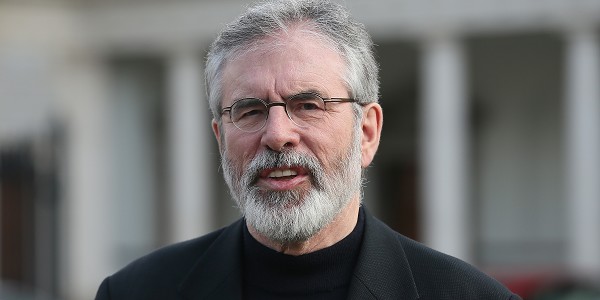Gerry Adams has dismissed warnings that Northern Ireland is dependent on hand-outs from the British government and that a United Ireland would be a financial burden on the Republic.
Mr Adams says the issue of Irish unity is now a matter of almost daily conversation and there is growing support on all sides for a referendum on a United Ireland.

Writing in his personal blog, he says: “Of course, there will be some unionists who will remain opposed to unity on ideological, cultural, or historical grounds. Or for emotional reasons. Some may also have fears about the future. But there are others who are open to persuasion that unity makes sense in the context of Brexit.
“These citizens believe in the equal provision of rights for every citizen. And they are open to positive arguments around economic growth and greater prosperity.
“There are also some nationalists, north and south, who also aspire to unity but are nervous, uncertain, and who similarly need to be persuaded.
“The claim is regularly made that the north’s economy is entirely reliant on ten billion pounds of a subvention that comes from the block grant from Britain. In a united Ireland it is claimed that Dublin would have to find this money and that as a result public services would suffer from cutbacks. This is not true.
“British Treasury Figures relating to the north and to the block grant are deliberately misleading and are purposely used as a source of misinformation to defend the union with Britain.
“The British Government claims that it allocated 24bn of public spending to the north for the year 2015-16. This figure is used by political unionism and others to argue that there is a 10bn deficit.
“Of this 24bn figure, 3.7bn is spent on British defence, overseas representation, and debt. This spending does not relate to the north. It is a matter for the British state and is not our debt. That leaves 20.3bn.
“The British Government estimates revenue generated within the north at 16.7bn. That means that the gap between what is spent and what is raised in the north is closer to 3.6 bn.
Mr Adams concludes that based on official British Treasury information the fiscal deficit in the north is at most in the range of £1.8bn to £3.6bn.
“In the context of Irish unity, in which the entire island is part of the EU, where the additional costs relating to the duplication of services are ended and with Irish control of our economic strategies, investment and growth, it is clear that Irish unity makes economic sense and is affordable.”
Mr Adams points to research titled ‘Modeling Irish Unification’ carried out by Professor Kurt Huebner of Vancouver University. “It concluded that Irish unity would likely result in a sizable boost in economic outcomes and incomes north and south, with the most aggressive unification scenario estimating a boost in all island GDP of €35.6 billion over eight years. That’s an increase in each of those years of €5,500 per person north and south.”
In conclusion, Mr Adams says that “achieving a referendum on Irish unity is no longer a matter of if but when”.

